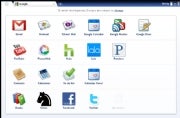
BERLIN — European regulators dropped their antitrust case against Microsoft on Wednesday after the software maker agreed to offer consumers a choice of rival Web browsers. The move ended a decade of legal strife that cost the world's top maker of software 1.67 billion euros in fines and penalties and forced it to alter the way it did business in Europe.
Enlarge This Image
Olivier Hoslet/European Pressphoto Agency
Neelie Kroes, the European competition commissioner, said the agreement with Microsoft was an “early Christmas present for more than hundreds of millions of Europeans” who would get “effective and unbiased choice” between competing browsers.
Related
Times Topics: Microsoft Corporation
Add to Portfolio
Microsoft Corp
Go to your Portfolio »
The agreement, announced in Brussels by the European competition commissioner, Neelie Kroes, calls for Microsoft to give users of its Windows operating system a choice of 11 browsers that compete with its Internet Explorer, made by companies like Apple, Google and Mozilla.
The five-year deal is an unprecedented concession for a company that, since its founding by Bill Gates and his partners in 1975, had largely defined, exploited and defended the advantages and rights of proprietary, commercial software.
When Microsoft first entered the cross hairs of European regulators in 1998 for including its media player with Windows, which operates 90 percent of the computers around the world, and for its use of confidential coding to favor its desktop and server software, the company fought back with legal guns blazing.
Microsoft lawyers argued that the commission's very logic was at fault; that computer users routinely used more than one media player and that bundling applications in one product was not in itself an abuse of market dominance.
But the commission, in 2004, and the appeals court, in 2007, dismissed Microsoft's arguments, and Microsoft abandoned its efforts to overturn the ruling in October 2007 after paying the equivalent of $2.4 billion in fines and penalties.
The outcome Wednesday, said Graham Taylor, the chief executive of Open Forum Europe, puts an exclamation point on the regulatory mood in Europe.
"The European settlement sends an unambiguous message to the market: software lock-in is dead," said Mr. Taylor, whose group supports the open-source movement. "Competitive, free choice should be the norm."
The settlement also capped a highly successful term for Ms. Kroes, who has wrung concessions from some of the top U.S. technology companies during her final year in office.
"Ms. Kroes's big contribution has been to raise the fines," said Annette Schild, a competition lawyer in Brussels at Arnold & Porter. "That has really raised the pain threshold and contributed to the commission's rising stature in antitrust cases."
Chastened by its setbacks, Microsoft had begun to slowly change its strategy two years ago, announcing that it would move toward sharing information with competitors. In the settlement, Microsoft agreed to divulge more information about the secret coding it uses to allow competitors to meld their products to Windows-based systems.
"We look forward to building on the dialogue and trust that has been established between Microsoft and the commission and to extending our industry leadership on interoperability," Brad Smith, Microsoft's general counsel, said in a statement.
Beyond the realities of the stricter European antitrust regime, what had happened to undermine Microsoft's business model in the interim, according to software and legal experts, was a significant shift in software industry practices toward openness and sharing.
First in Europe, and later in the United States, a movement began parallel with Microsoft's legal travails toward open-source software, in which companies created a product and gave it away for free on the condition that developers who incorporated the free innovations in their own products also pass them along without any legal strings attached.
Microsoft, the staunch defender of closed, proprietary software systems, was suddenly on the defensive. Its aggressive rebuttals in Europe had brought Microsoft a steady drumbeat of negative publicity. The founder, Mr. Gates, had even been hit in the face with a cream pie in 1998 while on a public visit to Brussels.
Mitchell Baker, the chairman of the Mozilla Foundation, which oversees development of Internet Explorer's biggest browser competitor, Firefox, said the European settlement reaffirmed the principles of self-determination and individual empowerment for computer users, giving them the maximum flexibility to piece together systems from different software.
"These principles are expressed in several components of today's announcement and together should result in a greater respect for individual human decisions," Mr. Baker wrote in his personal blog after the commission's announcement.
Whether the European commission's settlement shakes up the European browser market, which Microsoft dominates, remains to be seen.
Rival browser makers said the agreement represented a huge opportunity for their own products, which they said would also give Europeans more choice and a better ability to compare.





